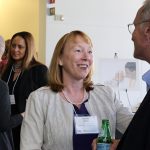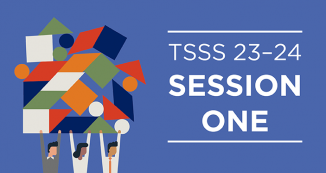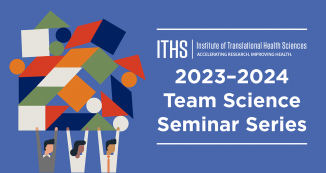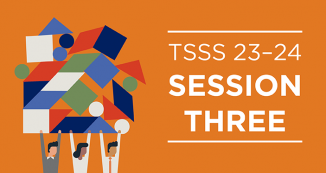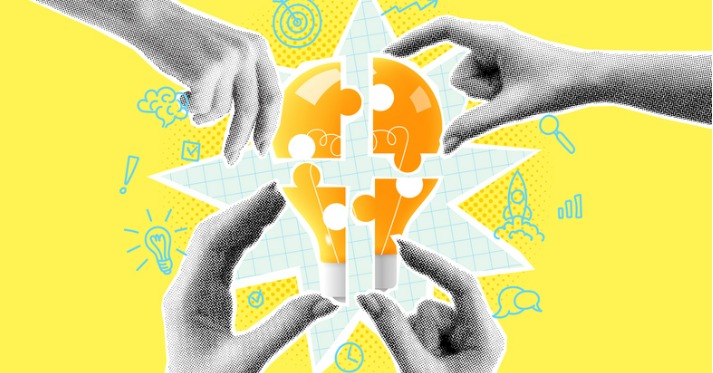
15 Jul In Its Second Year, the Team Science Seminar Series Has Evolved
Now in its second year, the ITHS Team Science Seminar Series has covered a broad range of topics, from writing team plans for grants to engaging with the community, and has increased participants since year one. We spoke with ITHS Team Science Co-Directors Brenda Zierler and Erin Blakeney about the second year of the popular series, which was held monthly from October 2023–June 2024. They told us what surprised them about this year and what they hope to accomplish in year three.
How would you describe the series to someone who has never heard of it?
Brenda Zierler: Well, it’s an overview of what team science is: how to put together a team, to understand how teams function and address some of the challenges teams might face. We had sessions on team writing, tools for collaboration, how to create psychological safety on your team.
Erin Blakeney: This year’s topics were identified in direct response to feedback we heard from our evaluations for last year’s inaugural series. People told us what questions and topics they were interested in. We developed the sessions based on the literature and the evidence and our own experience synthesizing into best practices and tools that people can use.
Who is your ideal seminar participant?
BZ: We are hoping to bring in pre- and post-docs, and early career faculty and research scientists. Basically anybody who’s going to be conducting research is going to be on a team, and anybody in the clinical environment, they’re also going to be on a team. You’re more likely to be working on an interdisciplinary team when you’re doing a pre- or post-doc, and that’s when they need these skill sets, so then, as they continue to move into faculty roles, they will have this background. We’re trying to coach them and help them to understand how teams function.
We also have a group of clinicians from the Masters of Science in Clinical and Translational Science program [developed by Larry Kessler, ITHS Translational Workforce Development faculty]. They are enrolled in the Team Science and Leadership course with nursing PhD students. All students enrolled in this course are required to attend 8 of 10 seminars to receive a certificate of completion. This year, we had an interdisciplinary group of 13 students who completed at least 8 of the 10 webinars. We want them to have this training early on because the future really is team-based research and team-based care, and they don’t always get that training in their own programs.
What did you focus on in year one of the program and what did you change for year two?
BZ: Year one was more a broad overview of team science, what “team science” means, and how does collaboration work, and then in the feedback they told us they wanted some pragmatic examples and more time for interaction during the seminars, so we added more interactive exercises, breakout groups, and tools this year.
With the growing number of multi-PI grants from NIH and other funders, investigators have to address team science and teaming and have a team management plan. We had a seminar focused on what the NIH asks and included sample language for teaming and team management plans.
EB: One of the questions we often hear from people is how do you kick off a new team, so we did a session specifically on building and sustaining a team. Last year we introduced the concept of team science and some of the frameworks, and this year we dove into questions like, in this particular era of your team, what do you do? What are some tips? What are some tools?
As an example, last year, Maggie Ramirez from ITHS Community Engagement did a session broadly on the idea of engaging communities in interdisciplinary research, and then this year, she focused on some tools for identifying and engaging with specific community partners. So it was going from the big idea of why you would want to do this, to different ways people go about doing it.
I understand you’re going to bring the series back for another year. What do you plan to do differently next year?
BZ: I think next year our focus is going to focus on leading teams and leading change on teams. It’s meant to be a team science and leadership series, so next year we’ll focus more on leadership competencies.
And how has your audience grown and changed over the two years of the series?
BZ: We’ve increased the numbers a bit, but what is interesting to us was there were several people who were at every one of the seminars last year and returned again this year.
EB: It’s creating a place for people who are interested in the subject, like a journal club or a Grand Rounds around a particular topic. It’s creating a space for people who are interested in teams both in terms of how do they practice and how do they work, but also just intellectually curious about what’s going on in the world of Team Science, which is kind of cool
What kind of impact do you want the program to have and how are you measuring that impact?
BZ: Our goal is to have future researchers leading teams who really understand team science and can behave in a way that’s collaborative and use tools that are relevant for every member of the team.
EB: With this type of a program, it’s difficult to identify direct causes and effects on individuals and teams. For example, it’s would be hard to assess or say we made people increase their writing productivity by, I don’t know 25%. It would be lovely if we could do that, but it’s not terribly feasible in this particular kind of intervention.
What we do right now is an immediate post-seminar evaluation that we ask attendees to fill out that asks them, did you like it? What did you learn? It’s pretty straightforward and there’s an open comment section for people to tell us what they might use, what additional challenges or topics they’re interested in.
With our Team Science Workshop participants, we’ve gone back a year later and interviewed them to see how they have used the tools that we introduced. It’s been interesting to see the different directions people take and the multiple ways in which they report team science education and training impacting their teams and their work. Now that we’ve done two years’ work with the Seminar Series, we’re having a retreat this summer to go through the evaluation data and map out a plan for the coming year, and we’d like to do a similar mixed methods evaluation with the seminar series participants to better understand the impact of the training.
Did anything surprise you about the series this year?
BZ: I think I was surprised that the same people that came last year were coming this year.
EB: I’ve been surprised, honestly, at some of the people who are taking it asynchronously. I’ve had colleagues who know that I work with team science and ITHS but who haven’t come to an ITHS training before that I’m aware of who will send me an email and say, “Hey, I needed something for a grant application and I was Googling around for resources and I found your webinar and watched it at like 11:00 PM on a Thursday and this was the only resource I could find that directly addressed it in a way that wasn’t me going down a literature rabbit hole.”
How have you worked with other ITHS teams to make this series succeed?
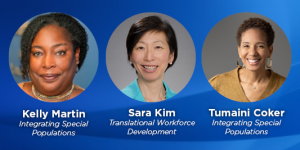 EB: As I said earlier, we’ve had an annual session with Maggie Ramirez from Community Engagement that has been really well received. There’s a lot of synergy between the idea of community engagement and team science. We also partnered with Sara Kim from Translational Workforce Development, who did sessions about conflict and psychological safety. Tumaini Coker and Kelly Martin from Integrating Special Populations did sessions on bias. Last year we partnered with the ITHS pilot grant program for a panel to highlight successful approaches to those applications. I think these help people see connections to other parts of ITHS.
EB: As I said earlier, we’ve had an annual session with Maggie Ramirez from Community Engagement that has been really well received. There’s a lot of synergy between the idea of community engagement and team science. We also partnered with Sara Kim from Translational Workforce Development, who did sessions about conflict and psychological safety. Tumaini Coker and Kelly Martin from Integrating Special Populations did sessions on bias. Last year we partnered with the ITHS pilot grant program for a panel to highlight successful approaches to those applications. I think these help people see connections to other parts of ITHS.
I also want to add the other ways in which collaboration within Team ITHS for this has been really great is the Communications, Evaluation and Education teams helped ensure that people know about the overall series and specific sessions, are able to register, that they’re able to get their evaluations in, and in facilitating the events. The wrap around support from ITHS has really helped to make this series successful.
We know you have a very broad audience. This year you had seminars ranging from kicking off a new team to bias and microagressions. Can you tell us the main purpose of the Team Science Seminar Series?
BZ: If our participants are going to be PIs or write grants with other disciplines, we want them to understand what team science is and how important it is. We said in our last grant application that we wanted to increase the knowledge and skills of team science and leadership competencies for early career faculty and pre- and post-docs, so that’s really the main purpose.
Is there anything else our readers should know?
EB: We will have the Team Science Seminar Series again in the coming academic year, and for teams we’ll be offering the Team Science Workshop over the course of six dates in October.
BZ: Also if people didn’t get the chance to attend the seminars, they can watch the videos over the summer and we’ll send out another round of participation certificates in the fall.
A certificate of completion will be offered by ITHS to those who attend 8 or more of the 10 sessions and complete the evaluations. Certificates will be sent on October 1, 2024 to individuals who completed sessions and evaluations between July 1, 2024 and September 30, 2024. See below for links to each session.
| Session Title | Event Page Link |
|---|---|
| Introduction to the Team Science Seminar Series 2023–2024: Teamwork and Collaboration | Watch event video |
| Kicking Off a New Team | Watch event video |
| Team Writing: Opportunities & Challenges | Watch event video |
| Tools for Collaboration | Watch event video |
| Promoting Psychological Safety at Workplaces | Watch event video |
| Strategies to Identify and Engage with Community Partners | Watch event video |
| Getting Promoted as a Team Scientist | Watch event video |
| Developing Team Management Plans for Grants | Watch event video |
| Leadership: Managing Up and Delegation | Watch event video |
| Mixed Messages: Bias & Microaggressions | Watch event video |
The ITHS website is your source for information about translational research resources in the WWAMI region. Find us on Facebook, X, and LinkedIn. Sign up for our newsletter, “The Research Connector,” here!




